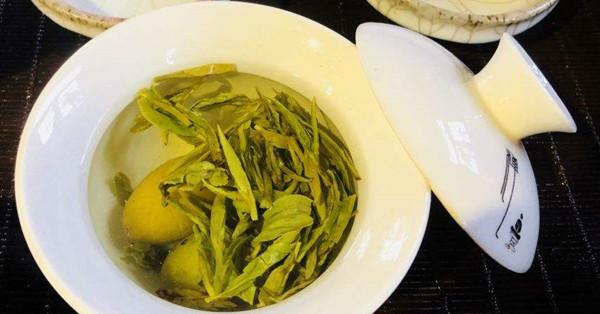Recently, friends often call and ask: Every spring festival, I go to the old Shanghai tea house to drink Yuanbao tea, where to drink this year (Note: temporarily closed due to relocation)? In fact, there used to be Yuanbao tea in the Jiangnan area, but now it is almost gone. However, in Shanghai, Yuanbao tea is still deeply rooted in people's hearts, and the old Shanghai tea house in the old City Xiang area has provided Yuanbao tea for twenty years.

In the Spring Festival, Yuanbao tea is actually a good way of communication between people. In the family, the younger generation worships the elders and brews the Yuanbao tea before it is carried out; when the shou is old, it is necessary to brew the Yuanbao tea. People feel that when they brew yuanbao tea and put it on the refreshments, they can talk about family affairs, talk about expectations, talk about feelings, and feel that they are happy to get together and enjoy themselves.
During the Spring Festival, drinking Yuanbao tea in the tea house is a way to bid farewell to the old and welcome the new, express good wishes to each other, and congratulate each other on the beauty of getting rich every year and wishing for every year. While drinking Yuanbao tea and eating snacks, people chatted, talked about their parents, and planned their new year's life. This is also a platform for the inheritance and extension of traditional culture, with tea to worship ancestors, tea to entertain guests, tea to meet friends, etc., reflecting the etiquette and morality in Chinese culture.
In the past, the old Shanghai tea house innovated on the basis of Yuanbao tea, putting an olive branch on the tea plate, and it was much easier to explain it to foreigners: this is "peace tea" - tea and the world, and qi and wealth. They all gave a thumbs up. It has enabled the original family and harmony, the clan harmony, and the neighbor harmony to develop into the kingdom and the world.
Judging from the geographical environment and history and culture of the old city of Shanghai, as well as people's lifestyles and production habits, it is the place where "Yuanbao Tea" is bred. The Old Town Of Shanghai area is the meeting point of Yuanbao tea material and culture.
From the perspective of Shanghai's history, from the Tang Dynasty onwards, the population began to be dense because of the more developed business and shipping. In the 29th year of the Yuan Dynasty (1292), Shanghai LiXian was also under the jurisdiction of Songjiang Province. From the perspective of the establishment, the Shanghai area has the basis for nurturing its own folk customs.
From the perspective of economic foundation, Lu Kai's "Miscellaneous Works of Qingbaotang" "and from Wuhaiyi (Shanghai County) in words: Wuyi is secluded on the seashore, and the four-square boat car does not pass through its place", and the proverb is "Little Suhang".
Judging from the olives used in Yuanbao tea, Shanghai is one of the important transport places for olives. Since ancient times, Shanghai has been an important port for China's foreign transportation and trade exchanges, and its back is the rich Jiangnan region. As early as 746 AD, during the Tang Dynasty, the Tang Dynasty set up a town in this area that controlled the river and the sea, that is, Qinglong Town (northeast of present-day Qingpu District, on the south bank of the Suzhou River), to develop a port for ships to dock. After entering the Song Dynasty, Qinglong Town had the title of "the first trading port in Jiangnan". In 1111, the Northern Song Dynasty set up a municipal shipping department here, collecting customs duties and managing shipping. In 1404, the Huangpu River was formed. Therefore, Shanghai has an environment that nurtures Yuanbao tea.
Judging from the Shanghai gossip, it is also more in line with the culture of Yuanbao tea. "Green olive" is, in Shanghai gossip, "please come over." Olive, Shanghai gossip is also called "Dafu Guo" and "Yuanbao".
Judging from the layout of Yuanbao Tea, it was a necessary tea for every household in the Jiangnan area centered on Shanghai at that time during the Spring Festival. The Ming Dynasty Zhengde's "Chronicle of Jianchang Province" records: "In the most serious year of the people, the neighbors of the relatives are salty and crowned, and those who are slightly neglected pay attention to the books and stabs, and the Yishi is honored by the green fruits and tea." The Qing Dynasty Tongzhi "Guangchang County Chronicle" records: "(New Year's Day) the neighbors of the countryside to throw thorns back and forth, with green fruits to deliver tea as a respect." ”
Although Shanghai is more influenced by foreign cultures, many traditional customs have disappeared, but the unique custom of "Yuanbao tea" is still deeply rooted in people's hearts, and every Spring Festival, Shanghainese specially go to the old Shanghai tea house in the old city to drink Yuanbao tea. It can be seen that "Yuanbao Tea" has formed a special and profound custom in the old city of Shanghai. (Zhang Jianming)